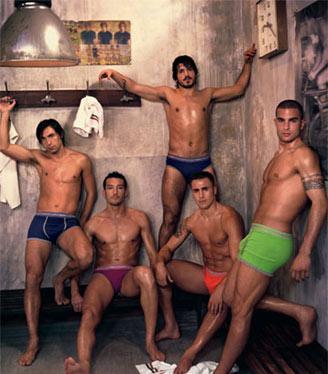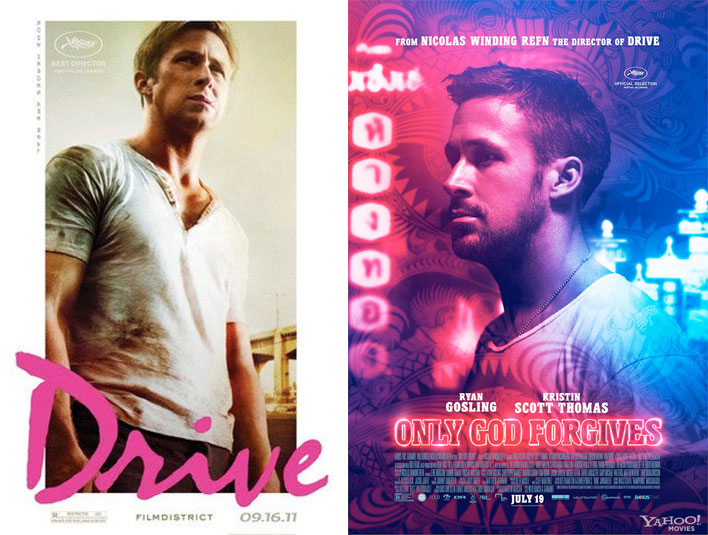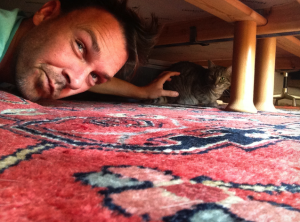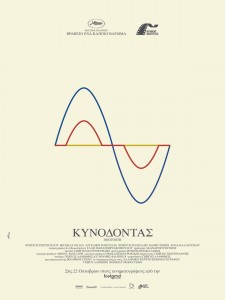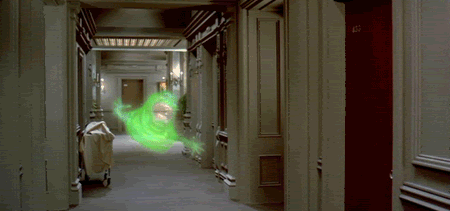Dear Rauan,…(6)
*****
[ note: some letters, like this one, require immediate attention — which is fine by me, because, of course, I am here to help, day and/or night ]
Veronica from Northern California:
dear rauan,
my son is gay but far worse I think she’s a poet and I am quite anxious for her. I know I am a worry wart but poets in their poor little poetry fantasy world are such a sad sack full of bad laundry.
and people are cruel and hate! … rauan, I need to change my kid. what can I do? where can I send her?
thank you in advance
Veronica D.
*****
*****
And, so–
Rauan Responds:
*****
Dear Veronica,
1) let’s start with Flannery: “He and the grandmother discussed better times. The old lady said that in her opinion Europe was entirely to blame for the way things were now. She said the way Europe acted you would think we were made of money and Red Sam said it was no use talking about it, she was exactly right.”
2) This may be counterintuitive READ MORE >
I Still Think About the Bomb Sometimes

After The Day After ran on ABC in November, 1983, it took me weeks to sleep normally again. The attack scene cycled through my brain, night after night. But not the panicky running and the electromagnetic pulse. Just the mushroom cloud. Just the bright light revealing the skeletons within the doomed. Just the fire and the flash.
Much of The Day After takes place in Kansas City. At the time, my family and I lived in Kansas City. Because of The Day After, and until he left office, I was always at least a little afraid of Ronald Reagan.
§
This pizza place near our house had some arcade cabinets, and the one I liked best was Missile Command.
Here’s the best decision the designers of Missile Command made on the cabinet: they gave it a trackball. A joystick makes reliable moves. A trackball is about imprecision. READ MORE >
Reading what’s extraneous
Last week at Big Other, Paul Kincaid put up a brief but intriguing post in which he asks to what extent various factors surrounding a text influence the way we think about it or its author. He gives the following example:
The program I use for databasing my library pulls down information from a wide variety of sources ranging from the British Library and the Library of Congress to Amazon. More often than not, this can produce some very strange results. I have, for instance, seen novels by Iain Banks categorized as ‘Food and Health’, and novels by Ursula K. Le Guin categorized as ‘Business’. In all probability, these are just slips by somebody bored, though you do wonder what it was about the books per se that led to such curious mistakes.
Paul’s musings raise many interesting questions. For one thing, we might wonder whether the factors he’s describing are indeed extraneous or external to texts. Because I can imagine a good post-structuralist immediately objecting that texts more porous than that, and that it’s all just a sea of endless texts slipping fluidly into one another.
Me, I don’t have a problem with treating texts as discrete and coherent entities, but I admit the situation is complicated.
“I started a micropress, published my own chapbook, and got in a car to drive around the country promoting it at any place that will return my e-mails and phone calls not because I think the system is broken. I just think the system is bigger than it appears to be.” — from a really entertaining and no-lavender-aerosol take on DIY micropublishing and touring by Ryan Werner at Passages North
SICHA, CLINTON, CYRUS: THOUGHTS ON DIVERSE DEMOGRAPHIC REPRESENTATION IN MEDIA
Choire Sicha’s first book is out. I haven’t read it yet, but it is called Very Recent History: An Entirely Factual Account of a Year (c. AD 2009) in a Large City. The book party was at the East Village gay bar “The Cock,” and I have to say I have never seen it as packed as last night, at least as a pedestrian who quickly walked past it from the outside. There will be a lot of talk about the book, because almost everyone who reads (a lot?) online knows of Sicha. The book follows a group of gay men and chronicles their lives, but for some reason I trust it to not be regressive, even before I read it. I choose to believe Salon, that it will be “among a next wave of books about gay folks as full American citizens that doesn’t bother walking them through schematic journeys meant to stand in for the American Gay Experience.”
The active endeavor to ensure the meaningful participation of diverse individuals in media is integral. It helps reach a realistic and more informed view on the specifics of a broader range of identities. However, the constant overanalyzing of public figures’ gender, race and ethnicity identification choices may end up harming the very purpose they were intended to serve: letting individuals receive merit-based recognition for their objectively high-quality work.
A recent example of excessive analyzing of such nature is that of Hillary Clinton setting up a twitter account. Since the first moment she signed up for the social media website many jokes–some witty, others offensive–have been recurring. An approach that stuck out to me as particularly idiotic was the interpretation of how she chose to order the numerous qualities that define her in her two-line bio. To assert that Hillary Clinton is “anti-feminist” because she starts her twitter bio with “wife” and “mom” before addressing her professional accomplishments, is not only naive and judgmental, it is also self-righteous and flat-out manipulative. Policing the way people choose to present themselves, and telling them they are not to be taken seriously as feminists because they prioritize differently then the average feminist is expected to (?) is childish.
Additionally, who does not know that she also has served as Secretary of State? Pure common sense makes the dialogue surrounding the topic redundant. I think this line of thinking contradicts the true sense of feminism, as in such a system of order the women are provided the agency to identify how to present themselves. What about the people who use humor in their bios? Is that unethical? Are we taking things–such as a public figure’s social media presence–that seriously, and if we are, whose fault is it?
MANIPULATIVE NATURE OF THE DISCOURSE
A piece in The Millions presented a family saga focusing on the case-hardened nature of the way identity is performed by the writer and her grandmother, who seem to fall into the trap of being defined by the social expectations their social identities in how they attain and use power.
“As mixed-race girls, we learned to take what we could from where we could to make a whole. That’s a vulnerable position to be in, susceptible to second-guessing and collapse, but it’s also a crash course in manipulation. Hence the posturing of invulnerability. The multitude of ways that my grandmother and I announced a lack of need, and presented ourselves as in solid control. We don’t need you, we projected, and therefore we may have to ignore what you need as we go about proving that to ourselves once and again. One of the only things I know how to say in Chinese is: Wo zi ze lai. I can help myself.”
After its initial appearance, the ideology of representation has slowly lost a large chunk of its significance. There are times that I feel like I am not supposed to not like non-white writing, even if some of it has to be mundane, dull and entitled. The worst is when the writing is also patronizing and borders delusional. In some ways, if the argument is reduced to powerlessness as its selling point, it cannot easily be powerful when the powerlessness is not real.
I am not Miley Cyrus’ biggest fan, but an open letter addressed to her on The Huffington Post offended me. The writer aggressively requests Miley Curys ought to stop disrespecting “what feels black.” What he means of course, is that she should stop trying to emulate the rap element that currently dominates pop culture: she is white, thus cannot and must not do these things associated with what the author considers parts of the black identity, such as twerking. To claim these as an exclusive element of black culture is silly, and certainly flawed at its core: it leads to a new separation and division among people of different races. It seems like the writer might not be comfortable with a broadly inclusive culture that is not segmented the way he views it, or at least that is what the tone of his letter indicates.
His main issue and the central issue with her is her requesting producers that she was trying to go for a vibe that “feels black.” Her creative endeavor to do that cannot be offensive. It can be successful or not. While it is difficult to decide which is the case, at the end of the video for “We Can’t Stop” she smiles wearing a grill. It is not a mocking grin, rather a smile of awareness. She knows what she is doing, and she is doing it with a sense of humor.
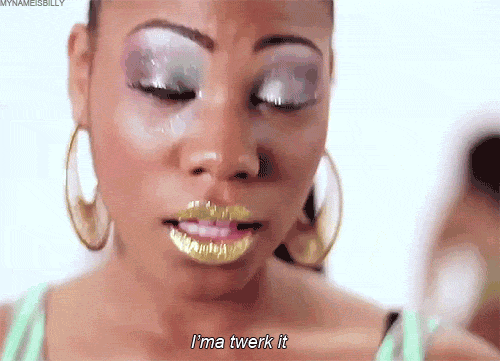
August 7th, 2013 / 1:21 pm
CGS’s “Drone Poetics,” or, my desire to be unobtrusive
Up at the Boston Review blog, Carmen Gimenez Smith gives real talk about being a poet-academic and the inherent privilege of it:
I often struggle with how I might best use the privilege I possess as a middle-class poet. I’m afforded the platforms of professor and writer, platforms I don’t really utilize to effect change in the world. This might be due to a cultural indoctrination suggesting that poetry is a marginal practice, yet poets such as Adrienne Rich, Denise Levertov, Gary Snyder, Brenda Hillman, and, more recently, Mark Nowak, Shane McCrae, Jena Osman, and Craig Santos Perez have utilized their privilege and platform to uncover, expose, and counter accepted narratives about living in a declining empire in which our agency as citizens is shrinking. While the government watches us, more and more poets and writers are watching back, documenting the injustices that stain our present moment. We need more of that. I should be doing that.
I’m currently editing this massive anthology with Joshua Marie Wilkinson called The Force of What’s Possible: Writers on the Avant-Garde and Accessibility (heading to an Internet purchasing place near you in 2015 from Nightboat Books). In it, we have roughly 100 original essays discussing the role of accessibility in writing as well as Badiou’s questioning of Empire and recognition. Putting together these essays, especially in light of Carmen’s BR post, I keep returning to a word: responsibility. What responsibility do we have as writers? Do we have a responsibility? To whom? Should we even care about accountability? And accountable to whom? We have this great power: the ability to tell stories. What do we do with it? Do we just recycle the same and call it new?
The Merger Of Ghosts

Penguin and Random House aside, it’s not unusual to witness the merger of two large companies – Publicis and Omicom this week, if regulators approve. These things happen, between competitors, in market spaces where the norm is already collusion, diffusion and consultancy.
Media companies and advertising agencies don’t provide value in simple or easily counted ways, though we are told that the services they bill are common, reasonable, or even essential to the operations of their clients, who actually make and distribute products. Mom and pop and factory floor.
Actually, in some cases client companies are as vaporous and high-minded as the agencies that provide ‘creative services’ or ‘brand management.’
Dear Rauan,…(4)
*****
[ helping people sometimes can be painful, yet liberating, but, as usual, I am here to help, in all my subtlety, & potency ]
*****
and this time we have Ariel from Denver:
dear rauan,
is it a good idea to castrate Patriarchy’s henchmen like Blake Butler, Rauan Klassnik, and Johannes Göransson? Some idiots say they’re exploring the darker side of human nature through an exaggerated male “lens” but I know in my soul that these guys are just straight-up misogynists.
I must confess, though, that one time I dreamed these three “doods” were forcing themselves on me (boot in the face, the Svelte Swede, and all that) and I woke up orgasming as hard as I’ve ever.
but tell me, dear rauan, should we castrate these vermins?
thank you in advance,
Ariel T.
*****
*****
LOSING CANINE TEETH: IDEAS SPURRED BY A MODERN GREEK FILM THAT IS NOT ABOUT MODERN GREECE
A DISTANCE FELT
I have a friend who I like spending time with but rarely end up seeing. The friend is a good person whose time means a lot, especially when it is shared with me. We call each other difficult, but what that means is that we like to hang out when we really want to, and refuse to negotiate our visceral wants for the other. It is a circumstantial friendship, despite its organicness. A major issue that arises frequently and poses Herculean efforts on both of our ends is that the friend lives in Brooklyn. [1] Despite the physical distance, it was the friend’s turn to come to me, because last time I went to Brooklyn, and I walked the Williamsburg bridge back and forth without ever seeing the friend, because the friend was asleep and never woke up and stood me up, and for that reason the friend would have to come to me this time and this was a non-negotiable term in an unwritten legal contract.
We decided to go to an East Village staple called “Sidewalk,” which is on Avenue A, and my friend grimaced a lot with my decision, because “how 90s grunge.” What the friend was going to witness would be a surprise, because this space was renovated ala gentrification in 2011 and there were no grimey aspects of my tall burger the very attractive (in a 90s way) waitress served me as she spoke in the familiar raspy voice that exuded bits of smoke here and there. [2]
What is interesting about where we chose to sit–which of course was the eastern side that functions as the smoking section of the outdoor seating area–is that it is located exactly near a gay bar called “Eastern Bloc,” which some people say belongs to Anderson Cooper’s boyfriend. [3] It was during our meal, or actually my meal since the friend was only drinking, on the smoking sidewalk that we witnessed a peculiar verbal fight in the street, the kind of fight that is violent only because of the words involved and how they were spat by people: aggressively and malevolently. It ended with someone calling a gay person a faggot, but the shock value was only increased when the assaulter and the gay person who stepped on his sneakers because he was too distracted by his phone were separated by a larger distance. It was then that the assaulter widened his eyes and tried to cajole his audience–us–with his empowering statement as he turned around and declared to bystanders of this incident: “It’s okay. I am gay, too.” READ MORE >



